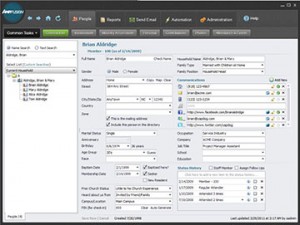 By John Connell
By John Connell
From data to disciple-making, this critical ministry tool has come a long way.
Do you remember what church management software (ChMS) was like when it first came on the scene? That’s the mental image some churches still have of ChMS, despite the evolution it has undergone since.
ChMS has been around for decades, going back to the days of DOS and rudimentary data-processing systems. Just like any other software, it was developed to maximize the potential of the hardware it resided on. In the early days, that was the PC.
ChMS was created to help office personnel by simplifying mailing lists, mail merge, and some other basic functions that those late 1980’s systems could handle.
RELATED RESOURCES
- Church Management software (chMS) “outside the box”
- Church Management Software Matters (A Lot)
- Get (and keep) their attention — with software
As software followed hardware, newer and more advanced operating systems allowed for improved functionality in the software. Through the 90’s and into the new millennium, we saw the progression from DOS and Windows 3.1 to networked solutions, ending up with the web-based solutions of today.
The new ChMS progressed as well, from basic back-office functions to attendance tracking and contribution management.
But, the real revolution began in the new millennium.
It’s a new day
While the world was watching the creation of Web 1.0, a major shift occurred in ChMS. The data-capturing systems of old gave way to more robust solutions. ChMS could now help ministries manage small groups, recruit and train volunteers, track an individual’s discipleship, and analyze trends.
The focus moved off of the church staff and onto the needs of the congregation. With this shift in focus, ChMS moved from mere data input to meaningful output.
Unfortunately, a significant number of churches still regard ChMS as a staff-centric solution, so they miss the greatest purpose of the solution: helping their people to build the Kingdom. This is just one of many reasons that their results fall short of churches’ expectations.
Several other mistakes cause some churches to get less than they were hoping for from their ChMS:
 Expecting technology to substitute for good processes. Without established processes and defined goals for ministry, no solution will be a success.
Expecting technology to substitute for good processes. Without established processes and defined goals for ministry, no solution will be a success.
Not allocating sufficient resources — personnel and finances — to get the right solution. Regardless of your congregation’s size, it’s imperative that you have a “data champion” — a staff person thoroughly invested in the success of the solution. You will also need the financial means to make it a priority. Its purpose, after all, is to help your people to grow as disciples.
Thinking the financial investment is the end. Actually, it’s just the beginning. And while we’re talking about investment, make sure you don’t overlook the work involved in transitioning into new ChMS. Most churches are coming from some type of platform already, and it’s likely that the new solution is different from the way they used to do ChMS. Transitioning promises to be a challenging process, but if you have chosen the right solution, it’s worth the effort.
Allowing a single area of focus to overshadow the needs of the church. It’s easy to allow one church department — say, the finance team — to have the dominant voice. But, this can lead to unintended consequences, such as resentment or even refusal to use the solution. Make sure that the final decision is one that everyone can (and will) support.
Picking a solution without evaluating the provider. Don’t be so mesmerized by the software that you fail to consider factors such as the provider’s tenure in the industry, approval rating by your peers, continual focus on product evolution, and best-in-class support. These could mean as much to your ongoing satisfaction as the solution itself.
What’s the mission of the software provider?
Ask yourself: Is the company Kingdom-minded? If there’s any question about this, then its primary purpose could be something other than — something less than — the spiritual development of its constituency. Unless the company’s vision is to build the Kingdom, you risk investing in a solution that fails to encompass the full scope of today’s ministry priorities.
So, what should you look for? Simply, you should look for a solution and a provider that most closely meets your needs. Notice we aren’t saying, “Look for an exact match,” as that’s not realistic.
There’s always the temptation to look at several top solutions, compare a plethora of amazing features, and then combine them into a single list of must-haves. Then, when decision time comes, you demand that one company provides all. Such an approach will leave you dissatisfied, no matter which provider you choose. The fact is that there’s no perfect provider out there.
A better approach is to weigh the pros and cons and make the best-fitting choice, making sure you’ve decided what your non-negotiables will be.
Another question to ask: Is the provider committed to future development? Will you have opportunity to suggest needed enhancements?
What’s its method of processing those suggestions? This could make your decision that much easier.
A successful solution from a responsive provider looks like this:
Kingdom-minded organization + current technology + completely integrated solutions + renowned support. End result? Equipping of the church to connect, engage, and grow disciples of Christ.
This is Elexio’s approach. Our software and our service are designed specifically for today’s progressive ministry. Here are some things that set us apart:
Our heart and our passion. As a team of former or currenly involved ministry leaders, Elexio is a company of people who have known the challenges of today’s ministry and who seek to support it through targeted software solutions.
 Integrated — no, really integrated — solutions. At Elexio, we know what having multiple complimentary platforms means to a church IT staff. Although integration through APIs (application program interface) and other middleware might be the solution preferred by other providers, a single-source provider is already connected all of the software your church needs.
Integrated — no, really integrated — solutions. At Elexio, we know what having multiple complimentary platforms means to a church IT staff. Although integration through APIs (application program interface) and other middleware might be the solution preferred by other providers, a single-source provider is already connected all of the software your church needs.
Keeping pace with today’s ministry requirements. Do you need responsive websites, efficient check-in options, a staff-friendly database, engagement tools, mobile apps, and web portals? Yep, we thought you might. And we make sure the data flows from one to the next without your needing to employ custom development.
We’ve got your back. How frustrating is it when the only way you can get a response is through email? We’ll take your emails and your calls. Your success means we’ve done our job. Our company wants to help you do far more than gather data — we want to help you to make disciples.
John Connell can periodically be found contributing to his company blog and various articles throughout the church community. Professionally, he directs the path of Elizabethtown, PA-based Elexio’s sales and marketing departments, while personally staying involved with the local church as a governing board member of the Lancaster Alliance Church in Lancaster, PA. With a sincere passion to see people know Christ, he works to bring relevant experience to the continual design of Elexio’s software.


